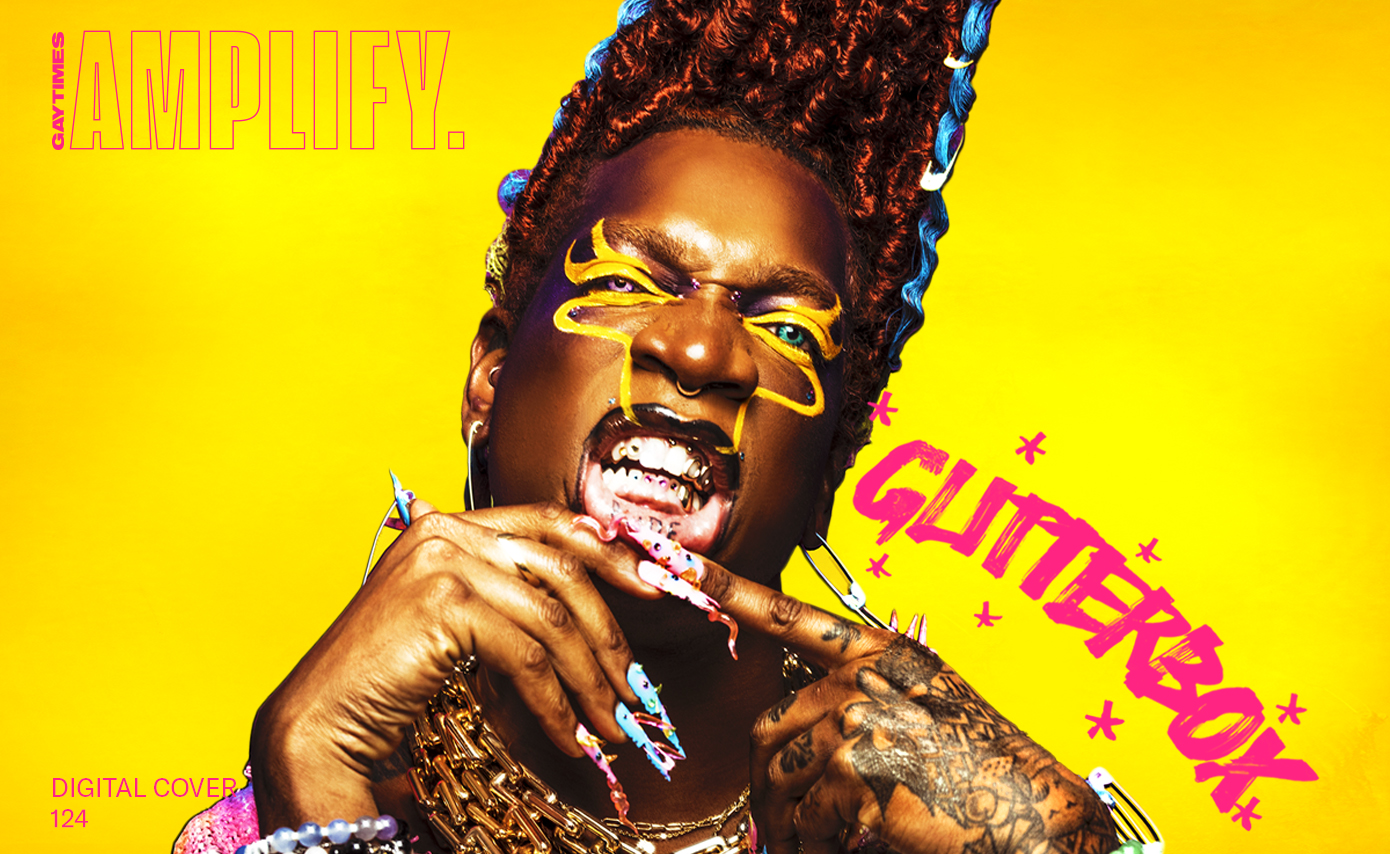
“It’s camp, it’s opulent, it’s over-the-top, it’s disco madness!”: That’s how DJ, performer and drag queen TeTe Bang describes Glitterbox, an inclusive nightlife phenomenon she has worked with for the last seven years. Since 2014, it has put on some of the fiercest club nights in cities all over the world such as London, Sydney and New York, bringing its signature mix of disco, house and classic dance anthems with it wherever it goes. It has also generated an uplifting atmosphere where everyone is welcome, something which is driven by its incredibly diverse group of performers. “Glitterbox is a very intentional space and I think that’s what makes it quite different from a lot of nightlife spaces,” TeTe explains. “We create it with an intention to try and be as representative and inclusive of all different cultures and communities as we can be.”
Nightlife plays a vital role in the lives of many LGBTQ+ people as it makes it possible to meet those with shared experiences who we may not have come into contact with otherwise. The Mx Fit, a performer who joined the collective at the same as TeTe, says being part of a safe space like Glitterbox has allowed him to find the “sense of community” he longed for after “repressing” his identity when he was growing up in Martinique, an island in the Caribbean. “I know that I would never be where I am today if I wasn’t in the presence of people from the community who have challenged my thoughts about gender, about identity, about sexual orientation and about also just not having to put a label on who we are or who we like,” she tells GAY TIMES, emphasising the power behind being able to “educate” an audience that is mostly made up of straight, cis, white people. “When they come to a party, they can’t ignore the fact that you’ve got trans, lesbian, gay, non-binary and pansexual people on stage from all ethnicities, literally from all corners of the world and we have a political message.”
Glitterbox will soon kick off a 22-week run at Hï Ibiza, one of Ibiza’s most well known nightclubs, which will include a stellar lineup of performers and DJs in one of the island’s most colourful productions to date. Ibiza is, however, not exactly known for its LGBTQ+ scene with its club nights and party atmosphere more generally focused towards straight people. “Having Glitterbox in a more typically heteronormative place like Ibiza provides an opportunity for everyone to go out and dance together in a space where everyone feels safe and free to be their most fabulous self,” explains Lucy Fizz, a performer who has been part of the team since 2015. TeTe echoes this, revealing that she “hated” Ibiza when she visited at the age of 19, but now loves it and feels Glitterbox’s “presence there has changed what people think of the island,” as well as how they party there. She continues: “Our presence there is so vital for queer people to have the space where they can come and feel like it’s their space because it doesn’t exist in any of the other clubs and, as a queer person to go there and work there, it’s incredible. The production is so high, it’s like the Broadway version of a nightclub and it’s unbelievable how grand the scale is!” Here, we speak with TeTe Bang, The Mx Fit and Lucy Fizz about the “futuristic” Glitterbox experience, what we can expect from its upcoming parties in Ibiza and why the “high camp confetti” event is so important for LGBTQ+ clubbers.
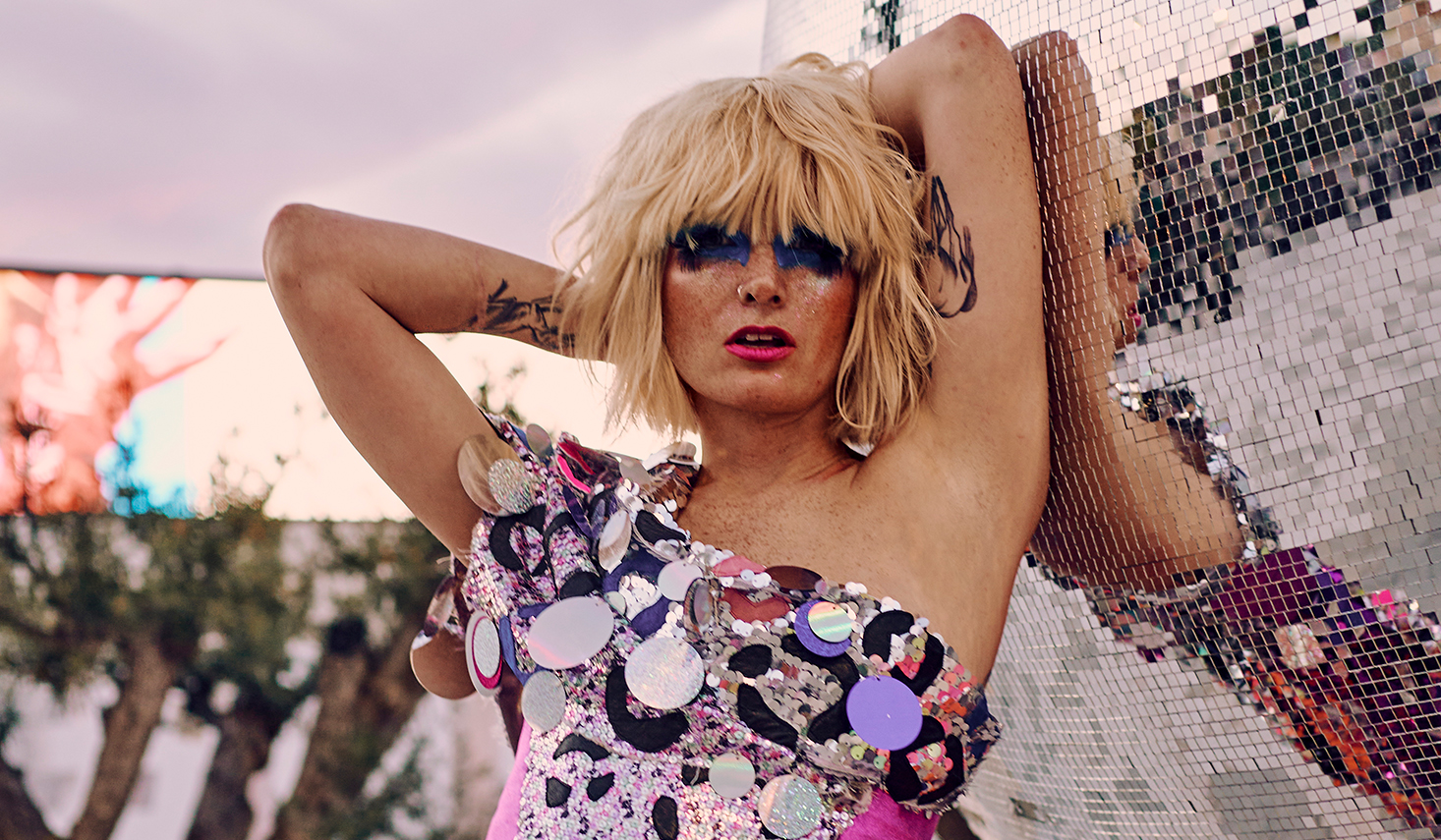
Nightlife tends to be a really vital part of the LGBTQ+ experience because it’s often how we meet our chosen family and people that we wouldn’t have otherwise come into contact with who have similar shared experiences. How has it helped each of you develop a sense of community?
TETE BANG: For me, it really was the place where I went to meet people. When I first moved to London when I was 18, I really came looking for something to belong to, you know? I came from rural England in the Lake District where there weren’t any visibly LGBTQ+ people and definitely no sense of community at all, but I knew it existed! I loved Madonna, I knew about gay culture, I knew that there was something out there that you could find and you could belong to. So when I first came to London, it was as simple as going to the closest gay bar to me, which happened to be the Black Cap in Camden – RIP – and I really just went out. I loved dressing up already and I’d go to the Black Cap and I met people so quickly and became friends with people and was given a space to start performing and start dressing up and start doing drag and really explore myself and who I was and what my queer identity was. It was also before the times of social media, but it really was as simple as showing up in those spaces and you’re all there with the same intention and the same want to belong and so people were just always so open and welcoming to me.
THE MX FIT: Growing up on a very homophobic island, Martinique, I spent a lot of my time repressing who I was. So I felt like when I moved back to Paris, I was seeking that sense of community because I felt like I spent eight years pretending to be “straight” and I almost forgot how to be myself, so I had to learn by watching what other people were doing. And I feel like over the years, the queer community has helped me come out again and again – continuously I’m evolving. The first time it was understanding what it is to be gay and then, when I moved to London, I discovered really what it was to be a queer club kid and a drag queen and it’s because of the community that I got my first job. And at the point where I am in my life, I identify as trans non-binary and I know that I would never be where I am today if I wasn’t in the presence of people from the community who have challenged my thoughts about gender, about identity, about sexual orientation and about also just not having to put a label on who we are or who we like.
LUCY FIZZ: For me nightlife was a hugely important part of my trans experience. As a teenager nightclubs provided me with a space to escape everyday life and experiment with my gender expression and identity. Then in my twenties, I found the love and acceptance of the queer community on the dancefloors of LGBTQ+ spaces like Dalston Superstore and Sink the Pink. This chosen family gave me a new freedom to embrace and be proud of my trans identity.
How would you describe Glitterbox to someone who has never been?
THE MX FIT: It’s a place where you’re going to meet people, you’re going to connect with them regardless of any of the differences or similarities you have, and you’re going to leave with a seed planted in your head because there is so much positivity, there is a lovely message and a strong one that is being spread and I think people are going to be very surprised when they come to Glitterbox and see that we can have a high production but still have a show that feels very humble and that feels very close to the crowd.
TETE BANG: I think it’s like a high camp confetti, explosion of inclusivity, great music, fabulous costumes, liberation and disco madness.
LUCY FIZZ: Glitterbox is a fabulous inclusive party where everyone is invited to dance and express themselves freely to a soundtrack of uplifting house and disco.
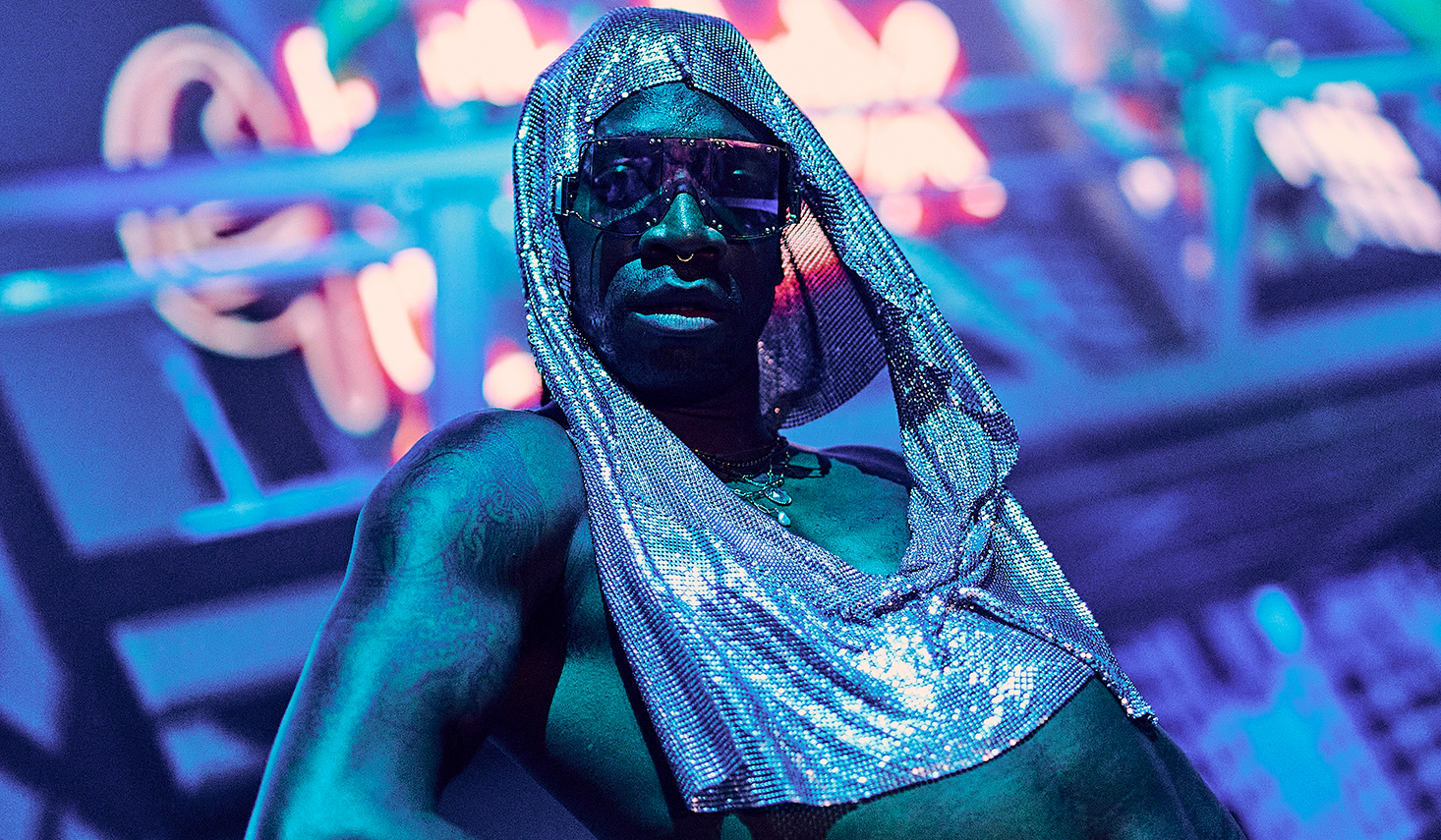
How important do you think it is that places like Glitterbox exist where people can go and not have to worry about how others perceive their identity and have it just be about them having a good time?
THE MX FIT: I think it’s really important because having dancers who come from different backgrounds, different ethnicities, we’re all on a set platform and I think everyone is going to bring something different. Either it’s their culture or it’s their sense of fashion from where they come from, or something about themself, and when we have a platform that is big and is mainstream like Glitterbox, the opportunity we have, especially because most of our audience is straight, cis, white people, is to educate them on things that are already happening every day in our life that people either don’t see or choose not to see. So when they come to a party, they can’t ignore the fact that you’ve got trans, lesbian, gay, non-binary and pansexual people on stage from all ethnicities, literally from all corners of the world and we have a political message. So I think we use this platform and we use the white audience we have to kind of just widen people’s minds and just widen horizons as well, because not everything is as we’ve been told on TV or in society.
LUCY FIZZ: Unfortunately it seems to be increasingly difficult for queer people to escape prejudice and discrimination in our everyday lives. It is vital that safer spaces, like Glitterbox, exist where we can come together and be with our queer community and likeminded allies to express ourselves freely and experience joy without fear.
TETE BANG: Glitterbox is a very intentional space and I think that’s what makes it quite different from a lot of nightlife spaces. We create it with an intention to try and be as representative and inclusive of all different cultures and communities as we can be. I mean, even in the queer community, when you go to even the biggest of club nights, they’re very white and very male. Cis, white, gay men do still rule the queer community, whether we like to admit it or not and so Glitterbox really is curated intentionally so that there is all kinds of representation within the space. That sometimes rubs people up the wrong way or sometimes people think it’s contrived or it’s fake or it’s just like a product. But really, it’s because this needs to happen within the community. There needs to be people curating a space with intention and with purpose, otherwise it won’t ever change and nightlife will stay a male, white space.
What would your message be to people who are apprehensive about a club night as inclusive as Glitterbox?
TETE BANG: There is actually space for everybody at the table! That’s the thing, those gay male spaces are always going to exist and that is fine, but there also needs to be other spaces as well. I think Glitterbox is really unique because we have created an intersectional party. We have created a space where the straights will come and the queers will come and party together. As we can see politically as well, things are changing and if we don’t band together and move forward, we’re going to stay separated and there’s always going to be the separation. And that’s the same with white, cis gays as well. Unless they choose to go into spaces that are more intersectional, there’s never going to be change going forward and it’s going to stay the same.
THE MX FIT: I think we’re still in the logic that because we’re minorities, we create spaces for us, by us, and with us, but the problem with that is we’re not educating people outside of just minorities. We’re not giving them the opportunity to walk into these spaces and, yes, there are going to be bumps in the roads. There’s going to be people not necessarily knowing how to behave or to communicate with us, but mistakes are meant to be made so that people can learn and be better. And, let’s be honest, we don’t have people like TeTe, Lucy and I in politics at the table talking and making things happen. People that are at the table and in those big rooms with all these politicians are straight, cis, white people. So, the more they have an understanding of us and the more comfortable they are with us, the more likely things are going to change and we’re not going to be seen as a threat, but more as part of the society.
LUCY FIZZ: Everyone is invited to come to Glitterbox and express yourself freely, whatever that looks like. We just ask you to come with an open mind and respect everyone else at the party. We have a very welcoming crowd and one of the things I love most about dancing for Glitterbox is seeing all the familiar faces on the dancefloor. So when I’m not on stage you’ll often find me down at the front dancing in the crowd.
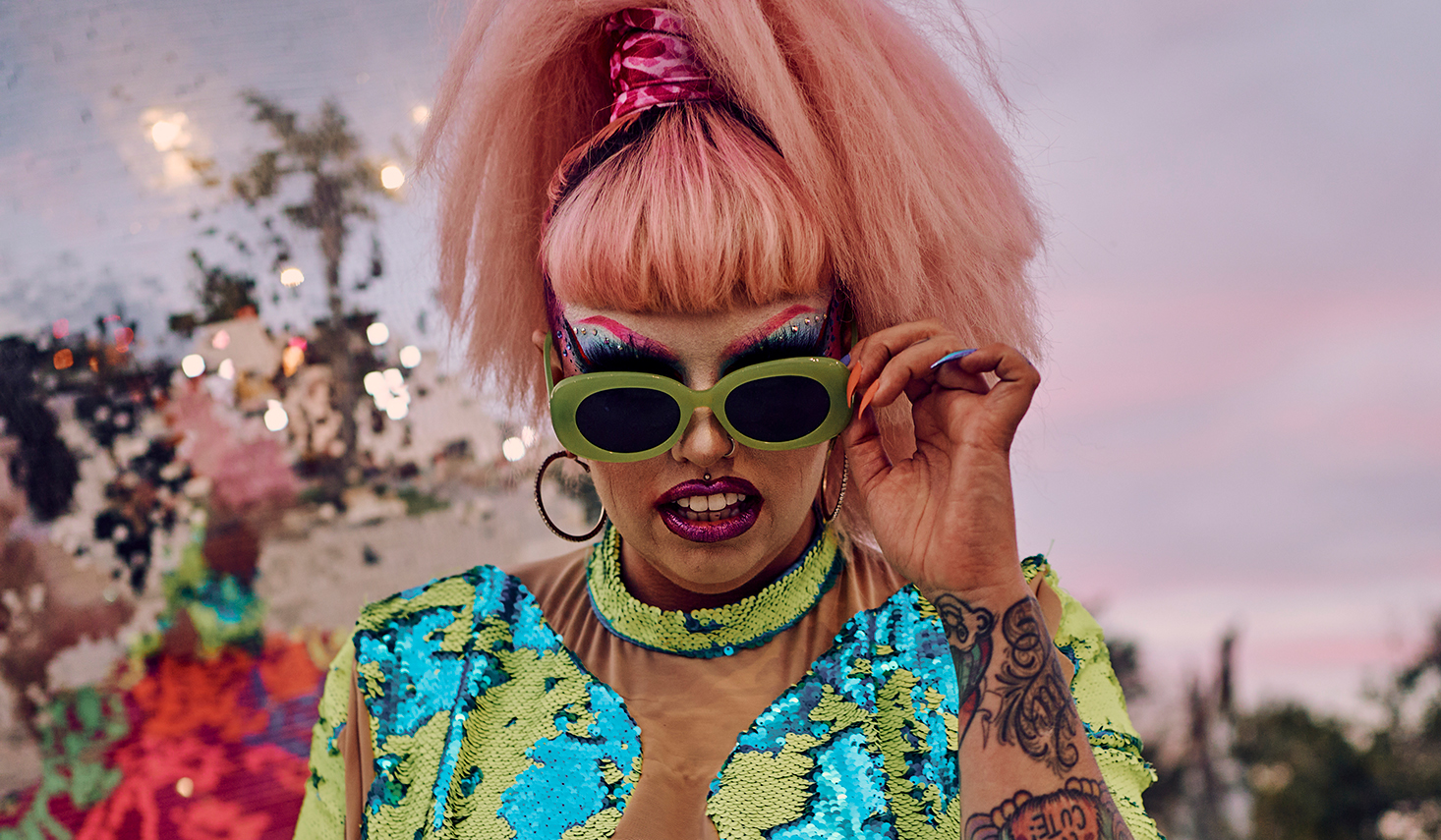
Something that has always been clear about Glitterbox is that its performers are allowed to showcase their individual styles and identities. How do you incorporate your authentic self into what you do with the collective?
LUCY FIZZ: What’s really amazing about Glitterbox is that all our performers bring something special and unique to the dancefloor and we are all celebrated for being ourselves. I know I am not the most technically skilled or graceful dancer, TeTe recently compared me to a tornado, but I bring all my energy and passion with me to the podium and the audience can see me up there living my best life and I think it really resonates with them. Tete, MxFit and I are also involved behind the scenes and lend our individual skills, knowledge and queer perspective to help shape and guide the brand.
THE MX FIT: I think we’ve been chosen for our identity, actually. They have seen something in us that was already there and over the years we’ve had the opportunity to work on a craft and our style has changed a lot. So, I think we just wanted to have a whole panel of people just expressing themselves in different ways and there is always room for improvement and there’s always someone that we can add to our team or that can bring something. We’re not looking at the team and being that’s it, everyone is represented. Glitterbox always crosses the lines between dance, culture and fashion and we wear some of the most amazing outfits of the whole club scene.
TETE BANG: So humble of you! We don’t ever tell people what they have to wear. There’s never a theme and there’s no dress code. You really do just bring what you feel like bringing and express yourself however you want to express and we will support you in that. I think the audience really responds to that because we all get messages from people who see us and relate to us in some way. I can speak for myself when I say that I get so many women especially say, “It’s amazing to see someone with your body type and a body that looks like mine dancing around and being confident” and I think the great thing about having people that have all different shapes, sizes and styles. Everybody in the audience is able to see somebody that they see a little bit of themself in that they relate to, or whether that’s what they want to be or what they want to relate to, they want to aim towards that level of confidence. I think that’s what we all genuinely want as well. We want to make people feel like you can do this. You can express yourself like this too. You’re allowed to, we are giving you permission because so often the world doesn’t give people permission to express themselves in different ways and so we are creating a space where we want people to do that.
THE MX FIT: Also, if we can do it, so can they! We’re not any different than them and if we look good in those things, so can they. Something really important, I think, about dressing up is you are basically exploring and extending your personality in ways that you would never think of if you just stay in what you’re used to. It’s almost like someone is giving you a white page and telling you that white page is you and you can recreate yourself in any way you want, there are no rules.
What can we expect from Glitterbox’s upcoming 22-week run at Hï Ibiza?
TETE BANG: Lots of glamour! It’s camp, it’s opulent, it’s over-the-top, it’s disco madness! We’re always inspired by this idea of Studio 54 and old school glamour. But we’re also taking new directions with the brand and letting it grow and be more futuristic and evolving. So I think people are going to be surprised by the direction that we’re moving in and it’s exciting!
THE MX FIT: It’s something that we haven’t done before, which is interesting because, like TeTe said, it’s so quick and easy to think, okay, Glitterbox, disco, Studio 54, it’s going to be disco balls and all the glitz. But we also want to show people that the music and the culture evolve and we evolve with it, we don’t want to just stay stuck in the past. So yes, you’re going to expect the unexpected and also expect to see, at some point, TeTe flying from the ceiling because she has been very clear that she would find a way to do her pink Arial moment.
TETE BANG: We have the facilities to fly someone from the ceiling and I want to be flown from the ceiling! Okay?! What’s really unique about Glitterbox as well is that a lot of the club nights take themselves quite seriously and there’s this idea that clubbing is cool and has to be mysterious and you have to act a certain way. We really break a lot of the rules when it comes to that because we are camp!
LUCY FIZZ: As always we have a mega line-up of DJs, performers and live PAs for our summer residency at Hï, which was voted number one club in the world. Make sure you don’t miss the infamous Wild Corner, our very own disco loos!
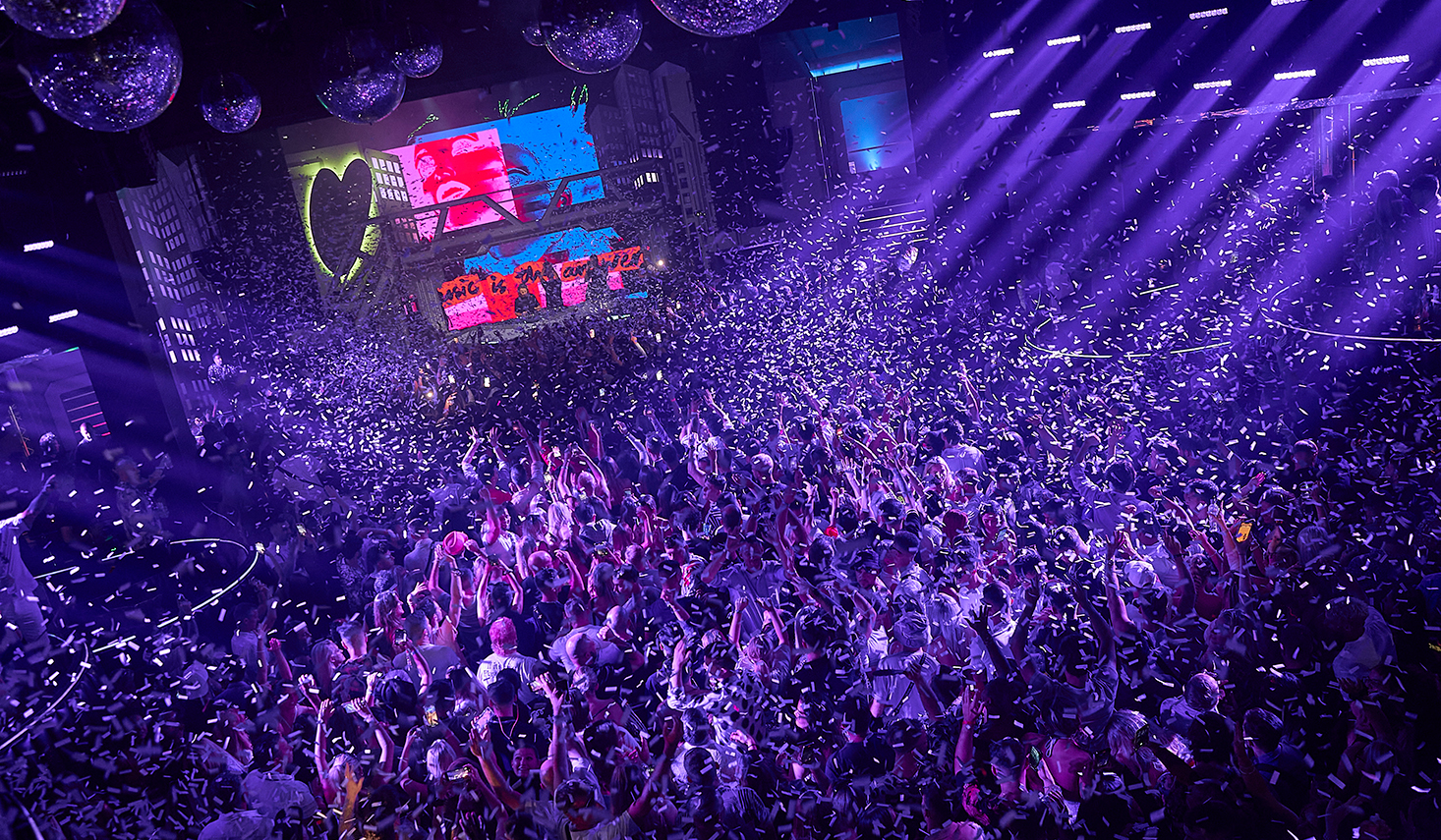
Glitterbox taking place in Ibiza is a chance to bring a diverse event to a space which is typically quite heteronormative. How important is it to have these types of nights in places where they may not have previously existed?
LUCY FIZZ: Having Glitterbox in a more typically heteronormative place like Ibiza provides an opportunity for everyone to go out and dance together in a space where everyone feels safe and free to be their most fabulous self.
THE MX FIT: I think Ibiza is a place that is already comfortable with queer culture. But one thing I would like to touch on is that a lot of these places, for example, host some queer nights, so on that night people are going to be a bit more mindful of who’s coming through those doors. But then, as soon as this night is over and they host another night, the following day is going to be a bit more straight and then all those, let’s say, protocols they had, allowing more people to come in, goes out of the window. There are still some clubs in Ibiza who refused us entry because I was wearing a crop top and a skirt and the security told me that men wear t-shirts and trousers and women wear skirts and crop tops. In an island like Ibiza, where we’ve been doing Glitterbox for many years, still having this situation – and that happened last year – shows me that there’s still a long way to go and a lot of work that needs to be done among the partying and among people coming and dancing with us.
TETE BANG: Ibiza is a very unique space. It has such a long history with music, dance culture and clubbing culture in general. I grew up in the ‘90s in Britain and I can’t even remember a time where I didn’t know what Ibiza was, there’s this whole history around Ibiza as a clubbing space and it is unfortunate that there is not a lot of queer visibility within that space now. I remember going there when I was 19 and I hated it, I absolutely hated it. It was very male dominated and there were a lot of like, “laddy” lads that are scary and terrifying as a queer person! It wasn’t until I went back with Glitterbox that I really enjoyed it because we had created a space. Our presence there is so vital for queer people to have the space where they can come and feel like it’s their space because it doesn’t exist in any of the other clubs and, as a queer person to go there and work there, it’s incredible. The production is so high, it’s like the Broadway version of a nightclub and it’s unbelievable how grand the scale is! And I think I think our presence there has changed what people think of the island and why they come to the island because I see a lot of our clients that come to our party are big groups of girls, but that also means that boys come and they’re boys that you would never normally imagine going into those queer clubs we would go to. And the fact that they’re coming into our space and they’re, whether it’s consciously or unconsciously, celebrating queer culture and queer people – even if they’re on the floor looking at us, shouting, taking videos – they are looking up at queer people on a stage and celebrating them.
Glitterbox returns to Hï Ibiza every Sunday from 7 May until 1 October. Tickets are available here.